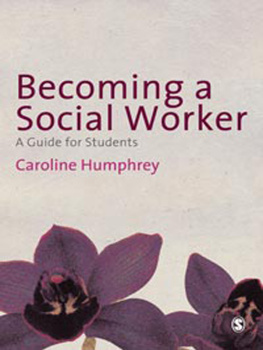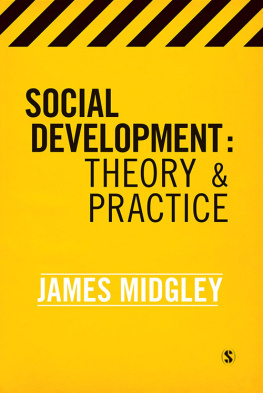
Integrating Social Work Theory and Practice
All social work students study theory and undertake practice placements. Integrating the two so that each informs the other is both essential and notoriously tricky. This accessible book demystifies the process and offers helpful evidence-based strategies for doing it successfully.
Structured around different approaches to learning, Integrating Social Work Theory and Practice covers:
adult- and student-centred learning;
learning and teaching techniques and assessment methods;
how to locate and identify theory;
how to critically analyse theory;
key theoretical concepts in social science;
issues surrounding anti-oppressive theory and practice;
methods of intervention;
integrating theory and practice in academic work and on placements.
This essential text helps students to identify, critically analyse and apply theory appropriately, enhancing their practice. It will be useful to all social work students struggling with the theorypractice gap.
Pam Green Lister is Director of the Masters in Social Work at the Glasgow School of Social Work. She teaches social work theory and practice and has researched widely within social work education.
Student Social Work
This exciting new textbook series is ideal for all students studying to be qualified social workers, whether at undergraduate or masters level. Covering key elements of the social work curriculum, the books are accessible, interactive and thought-provoking.
New titles
Human Growth and Development
John Sudbery
Mental Health Social Work in Context
Nick Gould
Social Work and Social Policy
An introduction
Jonathan Dickens
Social Work Placements
Mark Doel
Social Work
A reader
Viviene E. Cree
Sociology for Social Workers and
Probation Officers
Viviene E. Cree
Integrating Social Work Theory and Practice
A practical skills guide
Pam Green Lister
Forthcoming titles
Social Work Law and Ethics
Jonathan Dickens
Social Work with Children and Young
People, their Families and Carers
Janet Warren
Becoming a Social Worker, 2nd edn
Narratives from around the world
Viviene E. Cree
Integrating Social Work
Theory and Practice
A practical skills guide
Pam Green Lister
First published 2012
by Routledge
2 Park Square, Milton Park, Abingdon, Oxon, OX14 4RN
Simultaneously published in the USA and Canada
by Routledge
711 Third Avenue, New York, NY 10017
Routledge is an imprint of the Taylor & Francis Group, an informa business
2012 Pam Green Lister
The right of Pam Green Lister to be identified as author of this work has been asserted by her in accordance with sections 77 and 78 of the Copyright, Designs and Patents Act 1988.
All rights reserved. No part of this book may be reprinted or reproduced or utilised in any form or by any electronic, mechanical, or other means, now known or hereafter invented, including photocopying and recording, or in any information storage or retrieval system, without permission in writing from the publishers.
Trademark notice: Product or corporate names may be trademarks or registered trademarks, and are used only for identification and explanation without intent to infringe.
British Library Cataloguing in Publication Data
A catalogue record for this book is available from the British Library
Library of Congress Cataloging in Publication Data
Lister, Pam Green.
Integrating social work theory and practice : a practical skills guide/Pam Green Lister. 1st ed.
p. cm.
1. Social service. I. Title.
HV11.L54 2012
361.301dc23 2011029422
ISBN13: 978-0-415-48112-0 (hbk)
ISBN13: 978-0-415-48113-7 (pbk)
ISBN13: 978-0-203-13651-5 (ebk)
Acknowledgements
I would like to thank colleagues and students at the Glasgow School of Social Work, with whom I have worked on research in social work education. This collaborative work has formed the basis for this book.
1 Introduction
Social work education requires students to demonstrate the ability to integrate theory and practice in academic and practice learning settings in a critically reflective and anti-oppressive way. This text aims to offer some guidance on how you might develop these skills. The focus of the book is on the how to, so you will be introduced to a range of techniques and frameworks, which have been developed as a result of undertaking research into social work education with colleagues and students. The book is aimed at students at the start of their social work education. It is not a compendium of theories in social work but concentrates on the development of study skills. Therefore, in each chapter some social work texts are focused on in more detail to demonstrate how the material in the texts may be used. At the end of each chapter you are encouraged to complete exercises to assist you to develop these skills.

introduces students to the concepts of adult- and student-centred learning. It will examine learning styles before giving an overview of what might be expected on a social work programme. A range of learning and teaching methods will be discussed, followed by an outline of the main methods of assessment that you might encounter on your course.

In reflection, criticality and transfer of learning are examined, with reference to research undertaken with students in this area. A series of vignettes will be provided to show how the core concepts can be applied in practice.

How and where to look for theoretical explanations is discussed in the fourth chapter. It is acknowledged that, when asked to apply theory to practice, students often find it difficult to navigate through the large amount of social work and social work-related texts. You will be introduced to the key principles of inquiry drawn from research literature, and then to the process of problem-based learning. A framework for analysing social work texts will be suggested.

Anti-oppressive theory and practice is an area which often causes concern in students. Sometimes they are uncertain as to how they can demonstrate this, and it is viewed primarily as purely taking action. It is important that you understand the underlying concepts and the process of anti-oppressive practice. Therefore, there are two chapters which address the issues of anti-oppressive theory and practice. examines the processes of anti-oppressive practice such as empowerment, advocacy and service user and carer involvement.









 introduces students to the concepts of adult- and student-centred learning. It will examine learning styles before giving an overview of what might be expected on a social work programme. A range of learning and teaching methods will be discussed, followed by an outline of the main methods of assessment that you might encounter on your course.
introduces students to the concepts of adult- and student-centred learning. It will examine learning styles before giving an overview of what might be expected on a social work programme. A range of learning and teaching methods will be discussed, followed by an outline of the main methods of assessment that you might encounter on your course. In reflection, criticality and transfer of learning are examined, with reference to research undertaken with students in this area. A series of vignettes will be provided to show how the core concepts can be applied in practice.
In reflection, criticality and transfer of learning are examined, with reference to research undertaken with students in this area. A series of vignettes will be provided to show how the core concepts can be applied in practice. How and where to look for theoretical explanations is discussed in the fourth chapter. It is acknowledged that, when asked to apply theory to practice, students often find it difficult to navigate through the large amount of social work and social work-related texts. You will be introduced to the key principles of inquiry drawn from research literature, and then to the process of problem-based learning. A framework for analysing social work texts will be suggested.
How and where to look for theoretical explanations is discussed in the fourth chapter. It is acknowledged that, when asked to apply theory to practice, students often find it difficult to navigate through the large amount of social work and social work-related texts. You will be introduced to the key principles of inquiry drawn from research literature, and then to the process of problem-based learning. A framework for analysing social work texts will be suggested. Anti-oppressive theory and practice is an area which often causes concern in students. Sometimes they are uncertain as to how they can demonstrate this, and it is viewed primarily as purely taking action. It is important that you understand the underlying concepts and the process of anti-oppressive practice. Therefore, there are two chapters which address the issues of anti-oppressive theory and practice. examines the processes of anti-oppressive practice such as empowerment, advocacy and service user and carer involvement.
Anti-oppressive theory and practice is an area which often causes concern in students. Sometimes they are uncertain as to how they can demonstrate this, and it is viewed primarily as purely taking action. It is important that you understand the underlying concepts and the process of anti-oppressive practice. Therefore, there are two chapters which address the issues of anti-oppressive theory and practice. examines the processes of anti-oppressive practice such as empowerment, advocacy and service user and carer involvement.